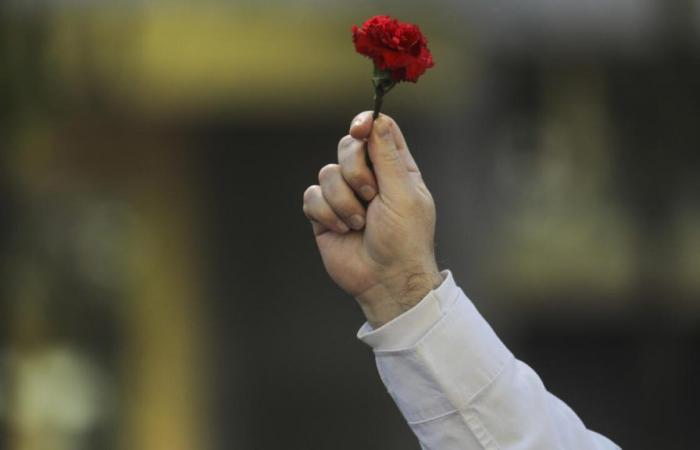This week, Portugal celebrated the 50th anniversary of the carnation revolution that ended the 48-year dictatorship through a military coup by the Captains Movement. The 25th of April opened a new era for Portugal, but also for its former colonies in Africa with which the Salazar regime was at war.
The 25th of April opened a new era for Portugal, but also for its former colonies in Africa with which Salazar’s regime had been at war for more than twelve years. A few months earlier, Guinea-Bissau had unilaterally declared independence, but Portugal had not recognized Guinea-Bissau as a free state.
The former President of Mozambique, Joaquim Chissano, at the time a fighter for Frelimo, the party that fought for the country’s independence, remembers that historic day.
“We knew the mood of the Portuguese troops that year, but we were surprised by the speed with which the thing happened. In 1974 we heard on the radio the announcement of the coup d’état in Portugal and we perhaps linked this to the maneuvers of those who wanted another type of of decolonization. So it wasn’t very clear. It was that reaction that we had to say ‘well there may be a coup d’état in Portugal, but that doesn’t solve the colonial problem.’ Therefore, what is needed is to resolve the colonial problem. Mozambique’s independence was the objective. That was the same day that some fellow comrades who were close by commented and we all commented afterwards. good to achieve a good result. Therefore, we were always available for dialogue with the new government. And so, when that happened, we were happy, but we did not have the necessary correspondence in the Portuguese delegation at the time. I then had to go through a series of contacts that led us to a second round and the final round, which was the signing of the Lusaka Agreement. This filled us with joy, but it was short-lived, because on the same day we signed it. There were uprisings here in Maputo, Lourenço Marques at the time, and it was a dramatic moment. But soon, we managed to calm things down, so we proclaimed independence in 75.” remembers the former President.
Pedro Pires, former president of Cape Verde and one of the leaders of the liberation struggle of Guinea and Cape Verde, within the PAIGC, considers that April 25th was an important milestone for Portugal but also for decolonization.
“The 25th of April is one of the most important historical events that took place in Portugal in the 20th century. Because I see in my reflections there is one before the 25th of April and one after the 25th of April. It will not be the first case, but it is the most important case in the political history of Portugal. On the 25th of April, I personally was a member of the PAIGC board and we followed the events with great interest, but the events were not a surprise to us, because it was known that Portugal was immersed in a major situation. crisis, in a military crisis, in a political crisis, in an economic and financial crisis, caused by the colonial war. See an interesting case to take into account that the head of the General Staff and the deputy chief of the General Staff came into conflict with power. policy, with the President of the Republic and with the Government at that time. Frankly, I think that the Government and other State institutions had lost legitimacy and credibility. Therefore, the way was open for a change in the regime.” begins by considering the former President of Cape Verde.
In Cape Verde, the Prime Minister responded to the President of the Republic who at the beginning of the week considered the inter-island transport situation in the country “chaotic”. In Parliament, Ulisses Correia e Silva said that the “chaos” in transport in Cape Verde existed until 2016, when the current President of the Republic, José Maria Neves, was the head of the Government.
“We are committed to improving and we will improve significantly. But it must be said that chaos in air and sea transport already existed. It existed until 2016, with planes impounded, with TACV in bankruptcy, with TACV without ATRs, with ships sinking permanently, with operators with obsolete ships and no operational capacity. Chaos has its moment of location very clearly and it has its people responsible. The same people who created chaos today talk about chaos in transport. Trust is needed in this country, it is necessary to ensure that in difficult situations gasoline and explosives are not thrown to create an even more difficult environment for Cape Verdeans” said Ulisses Correia e Silva, in an intervention in parliament, at the start of the debate on decentralization and local development.
It is recalled that the President of the Republic José Maria Neves stated that the air transport situation in Cape Verde is “chaotic” and has harmed the country. Before the official announcement, the president of PAICV, the largest opposition party, had already announced that the Angolan company BestFly would leave the country.
In Mozambique, The mission of the Southern African Development Community (SAMIM), which combats terrorism in Cabo Delgado, has already started delivering material to the Mozambican Armed Forces, as part of the withdrawal plan by 15 July, according to that force. Despite this exit plan, South African President Cyril Ramaphosa extended until December 31 the operation of the South African Armed Forces (SANDF), with around 1,500 soldiers, in the fight against terrorism in Cabo Delgado, northern Mozambique. , which until now was integrated into SAMIM.
In Guinea-Bissau, the Public Ministry announced the arrest of a prosecutor for alleged drug trafficking upon arrival in Lisbon on a flight from Bissau. The Public Ministry said it was monitoring the case and awaiting more information and, if “if the alleged crime is confirmed”promises to hold the judge criminally and disciplinary responsible.
This week marked World Day to Fight Malaria and, according to the World Health Organization, in 2022, more than 608,000 people died worldwide, with the African continent being the most affected, despite the promising effects of vaccination campaigns. Even so, Angola recorded a decrease in malaria deaths in 2023
Tags: April #25th important Portugal decolonization
--





